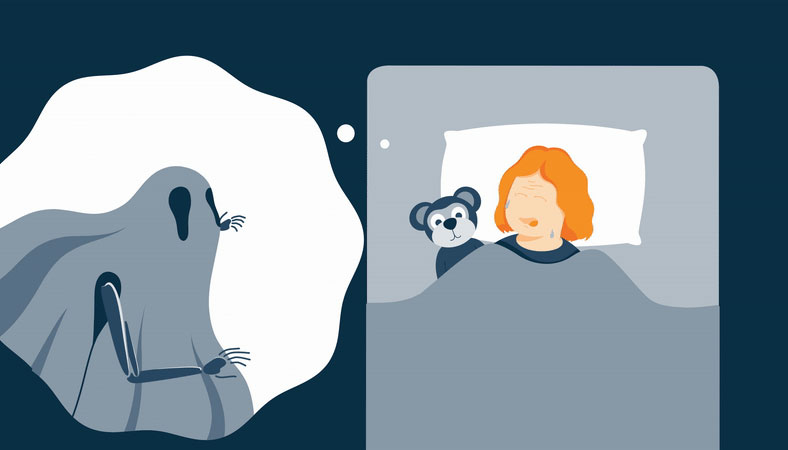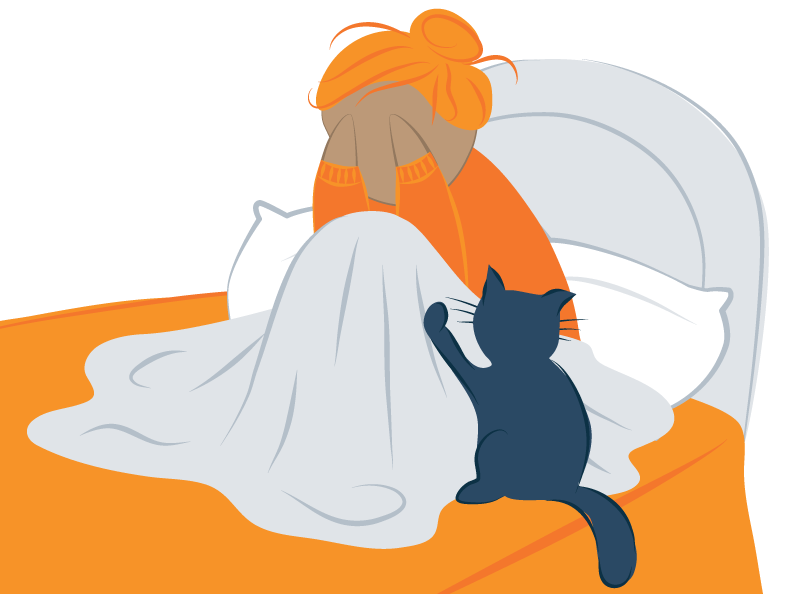Sleep Talking
Since the causes of sleep talking are not well understood, there is little evidence for how to stop it. Treatment for infrequent parasomnias is rarely needed. However, if treatment is needed, doctors may first try to look for any contributing factors like side effects from medication or other medical conditions. They may also recommend avoiding sleep deprivation.
How to Stop Talking in Your Sleep – 7 Usefull Tips
Also known as somniloquy, sleep talking causes someone to talk while they’re asleep; this phenomenon falls under the umbrella term parasomnia. Other parasomnias include sleepwalking, night terrors, teeth grinding, and even sex while asleep. The noises that sleep talkers make are typically more like groans, grunts, whispers, or laughs. Other times, the person could be having an entire conversation; however, you’ll only hear the side of the sleeper.
Navigation
Navigation
What Are the Symptoms of Sleep Talking?
Looking for symptoms before you realize you’re sleep talking will likely be a fruitless effort as the symptoms only occur while you’re unconscious. The main symptom of the disorder will be a verbal or audible expression or noise. For example, you could be saying a few sentences or mere gibberish, and both would be considered sleep talking. In fact, according to a linguistic study of sleep disorders, about 50% of recorded sleep talking consists of mumbled speech. [2] A large number of the recordings were exclamatory, profane, or negative in some way, which could indicate whatever is happening in the afflicted individual’s dreams. Episodes are often quick, and rarely long or conversational. There is some research suggesting a correlation to dreams; however, the ties remain inconclusive. [3]
Who Experiences Sleep Talking?
This occurrence is quite common in children, with about 50% of kids from the ages of 3 to 10 having frequent incidences. [4] Boys and girls are equally likely to talk while asleep, and experts theorize there could be a genetic link. If a parent had this habit when they were a kid, research indicates that the offspring are more likely to exhibit the same behavior. Surprisingly, men have more reported incidents than women.
What Causes Talking in Your Sleep?
REM Sleep Behavior Disorder
Dreaming occurs during REM (rapid eye movement). [5] This sleeping stage accounts for about 20 to 25% of the total time we spend asleep, and it’s a busy time for our brains. During this stage, eyes flutter rapidly underneath the eyelids, blood pressure rises, the heart rate increases, and brain wave activity is similar to being awake. During the REM phase, the body remains at rest, nearly paralyzed, which prevents us from acting out our dreams, that is, unless someone has REM Sleep Behavior Disorder (RBD). People with REM Sleep Behavior Disorder may indeed act out their dreams. Not only does this mean they could talk, but they could also get violent or even get out of bed to move around.
Despite the arguments of political opponents to the contrary, premium increases had been going on for decades before the passage of the Affordable Care Act, also known as Obamacare. In fact, the average rate of yearly premium increases decreased after the law was passed in 2010, according to Forbes.
Sleep Terrors
Sleep terrors are more commonly associated with children, but they can happen in adults, too. During a night terror, the person may seem like they’re awake. They could be screaming, yelling, kicking, and thrashing while they’re frightened about some vision they’re having, whether it’s a dream or a hallucination. [6] The next morning, the person with the night terror is unlikely to recall what happened.
Nocturnal Sleep-related Eating Disorder
If you’re wondering where your breakfast cereal went, you may want to look inward. NS-RED or Nocturnal Sleep-Related Eating Disorder happens when people eat while they are asleep. [7] They could even go into the kitchen and prepare an entire meal while completely unconscious. As you might imagine, if someone confronts the person while they’re devouring pantry goodies, they could potentially carry on a conversation, which would be another example of somniloquy.
Mental Health Conditions
Mental health disorders are frequently linked to sleep disorders as well. However, at this point, scientists cannot pinpoint if the mental health problem results in the disorder or if having a sleeping disorder results in mental health challenges. This chicken-egg scenario makes it difficult to discern the cause, but it could be helpful to keep in mind if you’re stuggling with either condition.
Medication
If you’re talking in your sleep, check any prescription drugs you’re taking to find out if one of the potential side effects could be somniloquy. Some individuals react uniquely to different medications due to individual genetic makeup. So it’s possible your doctor may need to adjust the medication or dosage.
Emotional Stress
Those with irregular sleep patterns are more likely to talk in their sleep. It could be because the brain is having trouble shutting down for the night, which disrupts the sleep cycle, or it might be the subconscious mind working overtime, trying to figure out a solution to a pressing problem.
Fever
Sleep talking while running a high fever is relatively common. This is because the body and brain are typically exhausted, as they’re diverting critical energy and resources to boost the immune system; rather than regulate what your body is doing during restful periods. Therefore, you may be more vulnerable to a nighttime talking incident.
Substance Abuse
Some drugs act as stimulants, keeping you awake. Others induce a state of drowsiness. Either way, the effects are artificial, and they wear off. In response, your body’s internal clock or circadian rhythm could be affected, throwing off the timing of your regular sleep schedule. As a result, you could have disruptions that could lead to talking while you’re asleep.
Sleep Deprivation
Not getting enough shut-eye could lead to somniloquy. Scientists theorize that people who aren’t resting enough have trouble passing seamlessly between the stages of sleep. You may take longer to shift from slow-wave sleep to the lighter stages, creating a larger opportunity for an incident. Those with this type of sleep disorder may also have a hard time waking up. The lengthened stage of grogginess could also cause you to talk, even though you’re not fully awake or conscious.
Genetics
If you’re sleep talker, you might be able to blame your parents. There’s been a genetic component to somniloquy that’s been identified, and while research is still inconclusive, many experts agree that genetics likely play a major factor. [8]
Alcohol
Like drugs, alcohol could also induce an episode. The initial drowsiness you feel after a glass of wine or two could cause you to fall asleep sooner than you would naturally. As the effects of the alcohol wear off, it could cause you to wake up, even just partially, which is an ideal setup for an incident.
How to Stop Sleep Talking
Make Sure You’re Getting Enough Sleep
One of our resident medical experts, Dr. Russell-Chapin, co-director for the Center for Collaborative Brain Research, explains that healthy sleep hygiene is critical. “When we go to sleep, our brains should be using the right brainwave for the right task at the right time. When healthy, the brain will often go from beta to alpha to theta to delta. If not, we get these unique sleep disorders.”
Manage Stress
Life can be stressful, and some of us are better at handling stress than others. If you let stress take over your life, it can lead to trouble sleeping. When you do finally fall asleep, you’re not likely to be able to rest as deeply. Similar to substance abusers, your body may have trouble shifting between sleep cycles, which could significantly increase your chance of somniloquy, sleep terrors, and more.
Limit Caffeine and Alcohol
Similar to substance abuse, ingesting things that aren’t healthy for our body could impair our ability to function normally. Further, if you’re habitually drinking both, you’re revving your brain up with caffeine, and then essentially telling it to calm down with alcohol; and these mixed messages could possibly be triggering episodes.
Seek Medical Advice
The advice of a doctor may help you shed some light on the situation. For example, a medication you’re taking could be at the heart of the issue. Your physician’s expertise might recommend that you avoid certain foods or activities before bed; we’re all unique, and sometimes a professional’s help is necessary.
Develop Good Sleep Habits
The best way to ensure a peaceful night of uninterrupted rest is to develop good bedtime habits, also called sleep hygiene. This means getting plenty of shut-eye and going to bed and waking up at the same time each day. Keep electronic devices out of the bedroom and consider adopting relaxing bedtime rituals, like reading a novel or drinking a cup of herbal tea.
Eliminate Noise
If your partner is the one who’s talking in their sleep, then you may want to block out any surrounding disturbances. Try headphones that are specially designed for lying down for sleep or silicone earplugs. You could also try a white noise machine, which could help to drown out background noises in addition to nocturnal mumblings. View Our Guide: Best Headphones for Sleeping
Keep a Sleep Diary
You’ll need the help of a partner or an app that records when you’ve been talking at night. Then take note of everything of importance that could cause a somniloquy. Note the time you went to bed and woke up, how long it seemed to take you to fall asleep, any food or drink you consumed that day and even stressful incidents that could have affected your ability to get adequate shut-eye. Over time, you may notice a pattern emerge. Once that happens, you can take steps to minimize or eliminate it altogether.
Frequently Asked Questions
Is it common in toddlers and children?
Yes, a toddler talking in sleep can happen in nearly 50% of children that age. In fact, up until about the age of 10, about half of all kids will have a semi-regular sleep talking habit. Fortunately, most people outgrow this habit. Only about 5% of adults display this behavior.
Does sleep talking have a significant meaning?
Usually, there’s a biological explanation for this parasomnia. Chronic fatigue, stress, and medications are all linked to this condition. However, in the absence of any of these factors, there could be a spiritual component. It might sound a bit “out there,” but inner energy shifts, emotional traumas coming to the surface, psychic disturbances, and actively processing internal conflicts through the dreaming process could all be potential triggers.
When you talk in your sleep, are you telling the truth?
Fortunately for those who sleep talk, the words usually contain little to no truth. The person afflicted is expressing audible noises or words in an unconscious state, and therefore has little capacity to discern between a real topic or a dream.
- [1] Ratan-NM. “Causes of Somniloquy (Sleep Talking).” News, 18 Dec. 2020
- [2] Arnulf, Isabelle, et al. “What Does the Sleeping Brain Say? Syntax and Semantics of Sleep Talking in Healthy Subjects and in Parasomnia Patients.” OUP Academic, Oxford University Press, 15 Nov. 2017
- [3] Nielsen, Tore, et al. “Dream-Enacting Behaviors in a Normal Population.” OUP Academic, Oxford University Press, 1 Dec. 2009
- [4] “Somniloquy.” Somniloquy – an Overview | ScienceDirect Topics
- [5] Purves, Dale. “The Possible Functions of REM Sleep and Dreaming.” Neuroscience. 2nd Edition., U.S. National Library of Medicine, 1 Jan. 1970
- [6] “Sleep Terrors.” Stanford Health Care (SHC) – Stanford Medical Center, 12 Sept. 2017
- [7] “Sleep-Related Eating Disorder.” National Institutes of Health, R.Robert Auger, 2006 Nov; 3(11): 64–70
- [8] National Institute on Drug Abuse. “Connections between Sleep and Substance Use Disorders.” National Institute on Drug Abuse, 9 Mar. 2021
- [9] “Sleeptalking.” MedLink Neurology
Sleep Talking
We regularly update our articles to include the latest research, expand coverage, and add new information as it becomes available.
Updated December 13, 2022
If you’ve ever talked in your sleep, you are in the majority. Sleep talking is common among adults as well as children. And while some may find it embarrassing, sleep talking usually isn’t dangerous.
Despite its frequency, experts are still unsure why people talk in their sleep. Researchers continue to explore new theories about what sleep talking might tell us about the brain. But for now, we can examine what we do know and what we don’t know about sleep talking.
What Is Sleep Talking?
Also known as somniloquy, sleep talking is a type of parasomnia. Parasomnias are unusual or undesirable behaviors that happen during sleep. Sleep talking can occur on its own, or alongside other parasomnias.
Sleep talking often occurs when an individual is just waking up. Yet, most people do not know that they are talking in their sleep while it is happening.
Sleep talking can happen during any of the stages of sleep, which include rapid eye movement (REM) sleep and non-REM sleep. This sets sleep talking apart from other parasomnias, which tend to occur during either REM or non-REM sleep.
How Common Is Sleep Talking?
Research notes it is difficult to know the exact prevalence of sleep talking, because it is difficult to study people who may not know they are sleep talking.
Yet, sleep talking is thought to be a common parasomnia. Experts estimate 70% of individuals do so at least once during their lifetime, and about half of children ages 3 to 13 talk in their sleep at some point.
Sleep talking tends to affect males and females at about the same rate. More research is necessary to determine how the condition impacts transgender and nonbinary individuals.
Symptoms of Sleep Talking
The main symptom of sleep talking is speaking during sleep without being aware that you are doing so.
People who talk in their sleep may vocalize single words, brief phrases, or complex sentences. Their speech can be loud, clear, and easy to understand, or it can be quiet or nonsensical. Usually, sleep talk does not address memories or refer to actual events in a person’s waking life.
Sleep talk can be unpleasant or loud, especially if one has a condition called REM sleep behavior disorder (RBD). Also, people who experience night terrors may say things that reflect fear or anxiety.
Although sleep talking is a parasomnia, experts consider it to be benign and do not recommend treatment for most cases. However, if other movements occur along with sleep talking, then another parasomnia may be present. And, if another parasomnia is present, it is possible that quality of life may be negatively affected.
Finally, some people who talk in their sleep may find it troubling or embarrassing, especially if they have a bed partner or share a room with others. Loud sleep talking can be disruptive and wake others who are sleeping nearby.
Why Do People Talk in Their Sleep?
Experts are still investigating why people talk in their sleep. Sleep talking often runs in families, so it may be at least partially genetic.
Sleep talking may be present in some individuals with certain mental health conditions. For instance, post traumatic stress disorder (PTSD) is associated with sleep talking. In addition, evidence suggests that sleep talking may be more common in children experiencing stressful events or who have symptoms of anxiety, depression, or behavioral disorders.
Researchers are unsure if sleep talking is related to dreaming. But, some researchers think sleep talking may offer insight into the dreaming mind and how the brain stores memories during sleep.
Sometimes, sleep talking is associated with other sleep disorders. These include sleepwalking, night terrors, and disorders that make people feel confused when they wake up. Sleep talking can also be a symptom of a condition called REM behavior sleep disorder.
REM Sleep Behavior Disorder
REM behavior sleep disorder (RBD) is a disorder that causes unusual behaviors during REM sleep, including sleep talking. People with RBD may talk in their sleep as they dream. They may also:
Normally, people’s muscles become temporarily paralyzed when they enter REM sleep. This paralysis ensures that people don’t act out their dreams. Those with RBD, however, do not experience this paralysis. As a result, they talk in their sleep and move about while dreaming.
RBD is common among individuals with neurological disorders like Parkinson’s disease and dementia. People may develop RBD years before they show other symptoms of a degenerative brain condition. However, other sleep disorders, head injuries, medications, and PTSD can also cause RBD.
What Does It Mean When You Talk in Your Sleep?
Researchers are still trying to understand why people talk in their sleep.
On its own, sleep talking does not usually indicate a medical problem. However, it can sometimes be part of another sleep condition, especially when it is combined with unusual physical movements. It may also indicate a family history of sleep talking, or a mental health condition like PTSD.
If sleep talking is negatively impacting your or your bed partner’s sleep, let your doctor know. You may also want to inform your doctor if you have experienced other symptoms or changes in your health, such as:
- Daytime sleepiness, loud snoring, or other symptoms of sleep apnea
- Unusual movements at night
- Sleep talking that begins at an older age
- Any episodes of nighttime confusion
- Taking a new medication
- Recent fever or illnesses
How to Stop Sleep Talking
Since the causes of sleep talking are not well understood, there is little evidence for how to stop it. Treatment for infrequent parasomnias is rarely needed. However, if treatment is needed, doctors may first try to look for any contributing factors like side effects from medication or other medical conditions. They may also recommend avoiding sleep deprivation.
Many parasomnias occur when a person’s sleep cycle becomes disrupted and they find themselves “trapped” between sleep and wakefulness. People often talk in their sleep just as they are waking up. Since an individual’s habits affect their sleep patterns, practicing good sleep hygiene might help in the treatment of parasomnias.
Better bedtime habits often require making simple lifestyle changes.
- Maintain a consistent sleep schedule: The body often has trouble adapting to new sleep patterns. Practice getting up and going to bed at the same time every day, even on the weekends.
- Avoid stimulants before bedtime:Caffeinated foods and drinks and nicotine can keep you up at night. Caffeine may take up to 8 hours to wear off, so save the coffee for earlier in the day.
- If necessary, adjust your medications: Some prescription medications and over-the-counter drugs can negatively impact sleep patterns. If you suspect that a medication is keeping you awake or causing you to talk in your sleep, let your doctor know. They may be able to offer an alternative or adjust your dosage.
- Make your bedroom an ideal place to sleep: Be sure that your sleeping environment is comfortable and promotes relaxation. Remove distracting electronic devices. Keep the room at a comfortable temperature and keep the lights low.
- Optimize your light exposure: Timing your exposure to light can help regulate natural sleep patterns. Try to spend at least 30 minutes in the sunlight in the morning, and dim all indoor lighting at night.
Tips for Sharing a Bed With a Sleep Talker
Having a bed partner who talks in their sleep can make it hard to get a good night’s rest. However, it is important to remember that they are most likely unaware of their sleep talking.
Sharing a bed can affect your sleep, but luckily there may be a few steps you can take to improve sleep with a partner.
- Wear earplugs: Try blocking out the sound with earplugs or noise-canceling headphones.
- Drown out the sound: Consider using a white noise machine to cover up the sound of your partner’s sleep talk. Or try playing music, running a fan, or utilizing another form of background noise.
- Keep communication open: If your bed partner’s sleep talk is frequent, loud, or particularly disruptive, you may want to suggest that they consult with a sleep specialist. A sleep specialist can determine if their vocalizations are normal or a sign of a larger problem.
- Sleep separately: If all else fails, try sleeping in separate rooms. This may help both you and your partner get better rest with fewer interruptions.
Frequently Asked Questions About Sleep Talking
Can Sleep Talking Physically Harm You?
On its own, sleep talking can be a normal part of sleeping. However, if it is associated with other sleep disorders, then it may negatively impact your health. For example, if someone also has a REM behavior sleep disorder, then injury can happen if one attempts to act out movements that occur during dreams.
Are There Any Conditions That Mimic Sleep Talking?
There are a couple of conditions that mimic sleep talking. People who have nocturnal epilepsy may vocalize in their sleep. Catathrenia is a sleep breathing disorder that causes a person to groan, but not talk, in their sleep.
Does Stress Cause Sleep Talking?
This is a difficult question to answer, as experts are not yet entirely sure what causes sleep talking. On one hand, limited evidence suggests that children who experience stressful situations may talk in their sleep more than others.
On the other hand, experts don’t think that the words verbalized during sleep talk reflect waking events. Also, they do not know if there is a relationship between words being verbalized and events in the mind while sleeping. Thus, researchers note the need for additional studies on sleep talking and how it may reflect activity in the mind both while awake and asleep.
References
- Accessed on November 12, 2022. https://aasm.org
- Accessed on November 12, 2022. https://www.uptodate.com/contents/approach-to-abnormal-movements-and-behaviors-during-sleep
- Accessed on November 12, 2022. https://www.uptodate.com/contents/classification-of-sleep-disorders
- Accessed on November 14, 2022. https://pubmed.ncbi.nlm.nih.gov/30594004/
- Accessed on November 18, 2022. https://pubmed.ncbi.nlm.nih.gov/10878151/
- Accessed on November 18, 2022. https://www.ncbi.nlm.nih.gov/books/NBK493222/
- Accessed on November 18, 2022.https://pubmed.ncbi.nlm.nih.gov/14573377/
- Accessed on November 14, 2022. https://doi.org/10.1093/sleep/zsy061.788
- Accessed on November 18, 2022. https://pubmed.ncbi.nlm.nih.gov/36362716/
- Accessed on November 16, 2022. https://www.ninds.nih.gov/health-information/public-education/brain-basics/brain-basics-understanding-sleep
- Accessed on November 16, 2022. http://healthysleep.med.harvard.edu/healthy/science/what/sleep-patterns-rem-nrem
- Accessed on November 16, 2022. https://www.nhlbi.nih.gov/health-topics/all-publications-and-resources/your-guide-healthy-sleep
- Accessed on November 18, 2022. https://www.ncbi.nlm.nih.gov/books/NBK560524/
- Accessed on November 18, 2022. https://www.cdc.gov/sleep/about_sleep/sleep_hygiene.html








